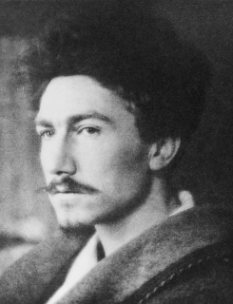Word of the Day
Ezra (EHZ-ruh)
· Common clues: Pound of poetry
· Crossword puzzle frequency: 6 times a year
· Frequency in English language: 24115/86800
Ezra Weston Loomis Pound (October 30 1885 – November 1 1972) was a poet, musician and critic who, along with T. S. Eliot, was one of the major figures of the modernist movement in early 20th century poetry. He was the driving force behind several modernist movements, notably Imagism and Vorticism. The critic Hugh Kenner said on meeting Pound: "I suddenly knew that I was in the presence of the center of modernism."

Ezra
Pound in 1913.
Because of his political views, especially his support of Mussolini and his anti-Semitism, Pound continues to attract much criticism. Nevertheless, it is impossible to ignore the vital role he played in the modernist revolution in 20th century literature in English. This importance may be considered under four headings: poet, critic, promoter, and translator.
As a poet, Pound was one of the first to successfully employ free verse in extended compositions. His Imagist poems influenced, among others, the Objectivists and The Cantos were a touchstone for Ginsberg and other Beat poets. Almost every 'experimental' poet in English since the early 20th century is in his debt.
As critic, editor and promoter, Pound helped the careers of Yeats, Eliot, Joyce, Wyndham Lewis, Robert Frost, William Carlos Williams, H.D., Marianne Moore, Ernest Hemingway, D. H. Lawrence, Louis Zukofsky, Basil Bunting, George Oppen, Charles Olson and other modernist writers too numerous to mention as well as neglected earlier writers like Walter Savage Landor and Gavin Douglas.
Immediately before the First World War Pound became interested in art when he was associated with the Vorticists (Pound coined the word). Pound did much to publicise the movement and was instrumental in bringing the movement to the wider public (he was particularly important in the artistic careers of Henri Gaudier-Brzeska and Wyndham Lewis).
As translator, although his mastery of languages is open to question, Pound did much to introduce Provencal and Chinese poetry, the Noh, Anglo-Saxon poetry and the Confucian classics to a modern Western audience. He also translated and championed Greek and Latin classics and helped keep these alive for poets at a time when classical education was in decline.
In the early '20s in Paris, Pound became interested in music, and was probably the first serious writer in the 20th century to praise the work of Vivaldi (who had been neglected for centuries) and early music generally. He also helped the early career of George Antheil, and collaborated with him on various projects.
The secret to Pound's seemingly bizarre theories and political commitments perhaps lie in his occult and mystical interests, which biographers have only recently begun to document. 'The Birth of Modernism' by Leon Surette is perhaps the best introduction to this aspect of Pound's thought.
This article is licensed under the GNU Free Documentation License. It uses material from the Wikipedia article "Ezra Pound".
|
|